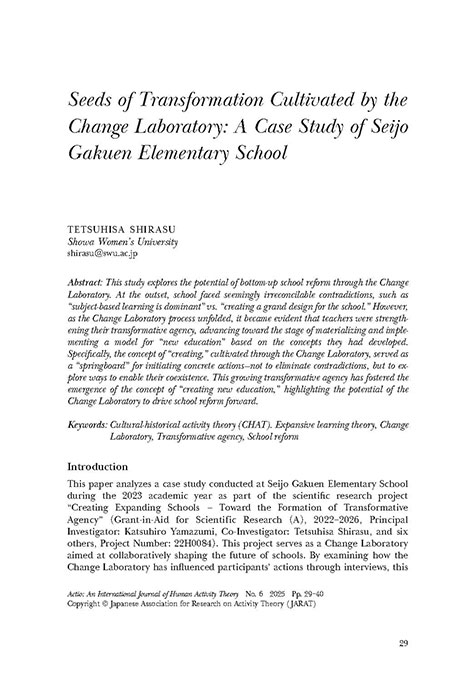
Abstract
Reference

Abstract
This study explores the potential of bottom-up school reform through the Change Laboratory. At the outset, school faced seemingly irreconcilable contradictions, such as “subject-based learning is dominant” vs. “creating a grand design for the school.” However, as the Change Laboratory process unfolded, it became evident that teachers were strengthening their transformative agency, advancing toward the stage of materializing and implementing a model for “new education” based on the concepts they had developed. Specifically, the concept of “creating,” cultivated through the Change Laboratory, served as a “springboard” for initiating concrete actions—not to eliminate contradictions, but to explore ways to enable their coexistence. This growing transformative agency has fostered the emergence of the concept of “creating new education,” highlighting the potential of the Change Laboratory to drive school reform forward.
References
Corbin, J., & Strauss, A. (2008). Basics of qualitative research: Techniques and procedures for developing grounded theory (3rd ed.). Sage Publications, Inc.
Engeström, Y., Pihlaja, J., Helle, M., Virkkunen, J., & Poikela, R. (1996). The change laboratory as a tool for transforming work. Lifelong Learning in Europe, 1(2), 10–17.
Ito,D(伊藤大輔).,& Yamazumi,K(山住勝広).(2024).「チェンジラボラトリーにおける拡張的学習行為の生成―成城学園初等学校での事例を通して―」『活動理論研究』第9号, 1–15.
Sato, M. (2018). Spread and Progress of School as Learning Community in Asia. Tsukui, A, and Murase, A. eds, Lesson Study and School as Learning Communities: Asian School Reform in Theory and Practice, Routledge, 3–13.
Yamazumi,K. (2021).Activity theory and collaborative intervention in education: Expanding learning in Japanese schools and communities, Routledge.